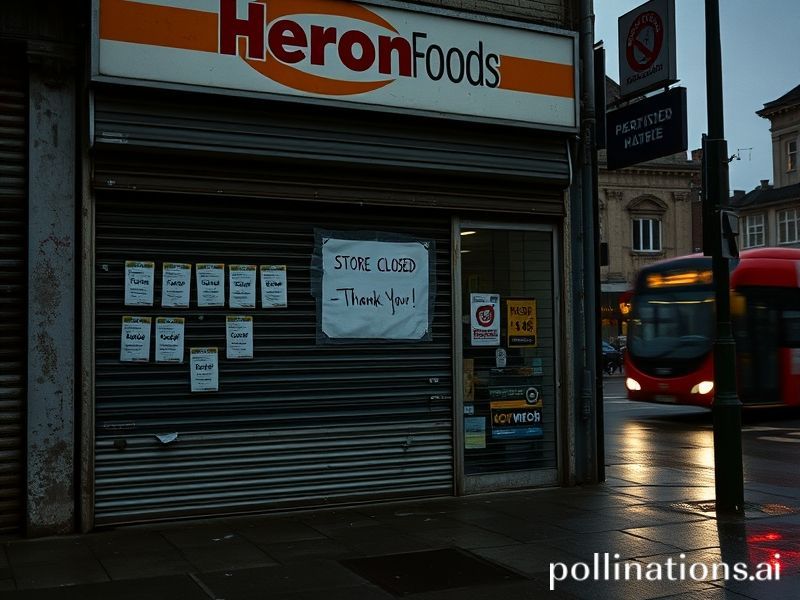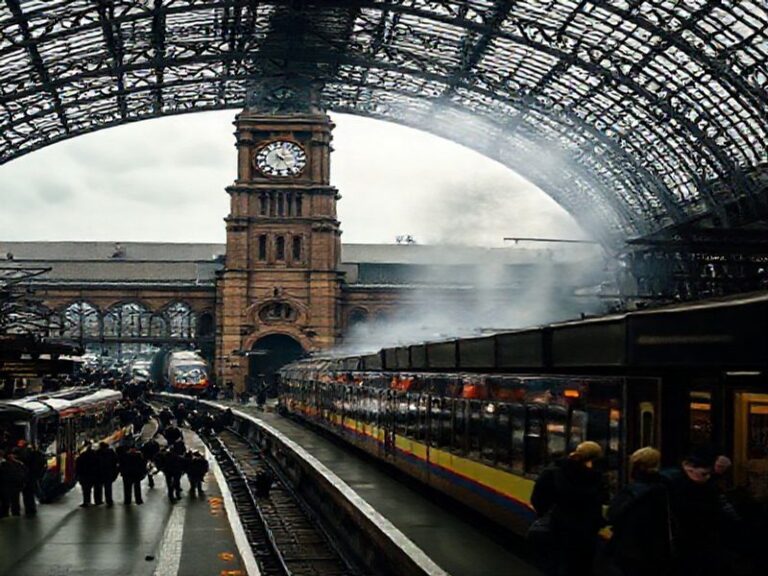Global Aftershocks of a Frozen-Food Funeral: How Heron Foods’ Closure Signals Worldwide Discount Extinction
A Heron Flies the Coop: How the Death of a Discount Grocer Signals the End of Civilisation (Probably)
The shuttering of Heron Foods’ last corporate-owned stores this month is, on paper, a tidy little British footnote: 14 shops across post-industrial Yorkshire and Humberside, a few hundred jobs, and a brand that most people outside Grimsby assumed was already dead. Yet from a safe distance—say, a rooftop bar in Singapore or a co-working space in Montevideo—the collapse of a cut-price freezer chain carries the faint whiff of something bigger. Like watching a single heron drop from the sky and realising the entire wetlands are on fire.
Globally, the demise of ultra-discount retail is a canary in the coal mine we’ve already strip-mined. Heron’s business model—stack it high, sell it cheap, pray the electricity bill doesn’t arrive—was the retail equivalent of a Jenga tower built during an earthquake. It worked only so long as energy subsidies, just-in-time supply chains, and an underclass with enough spare change for a £1 bag of mixed veg all held together. Remove any one block and the tower topples, taking with it the illusion that endless consumption is compatible with a planet that’s busy filing for divorce.
Consider the international ripples. In Manila, where sari-sari stores buy bulk pallets from similar European discards, the Heron closure means fewer surplus fish fingers for tomorrow’s merienda. In Lagos, importers who once shipped “accredited British frozen food” now look to Argentina or Vietnam, nudging up prices for everyone still pretending inflation is transitory. And in Washington think tanks, analysts add another datapoint to the great spreadsheet of Western decline, right between opioid deaths and the last season of The Crown.
The broader significance is almost poetic, in the way a tax audit can be poetic. Heron’s fate confirms that the bottom rung of the consumer ladder is now officially sawn off. When even the cheapest food becomes too expensive to sell cheaply, the global poor don’t downgrade—they evaporate from the market entirely, reclassified as “non-viable demographics.” Multinationals shrug and pivot to pet food for the emerging Asian middle class. Somewhere in Davos, a consultant pockets a bonus for discovering that dogs have higher lifetime value than hungry humans.
Meanwhile, the optics are deliciously grim. Tesco, Heron’s erstwhile white knight, walked away from the altar last year after deciding that 250 stores of limping frozen peas weren’t worth the PR hit. Instead, Tesco will funnel its spare billions into “dark stores” that never see a customer, staffed by gig-economy pickers racing against an algorithm that times toilet breaks. Progress, apparently, smells like warehouse disinfectant and desperation.
Of course, every ending is someone else’s beginning. The abandoned Heron units will shortly become vape shops, vape recycling shops, or “wellness centres” selling Himalayan salt that tastes suspiciously like regular salt. Local councils will celebrate “regeneration,” by which they mean replacing affordable calories with artisanal candles. And in a year or two, a Netflix documentary will eulogise the lost culture of £2 lasagne, scored to a slowed-down Smiths track for added melancholy.
None of this will bring back the heron. The bird has flown, leaving behind a chillier, more expensive world where the only thing frozen is social mobility. But chin up: civilisations come and go, yet somehow the global elite still finds a way to offshore the fallout. If you listen carefully from that rooftop bar in Singapore, you can almost hear the clink of champagne flutes toasting another successful divestment.
Conclusion: The closure of Heron Foods isn’t just about 14 shops in northern England; it’s a miniature requiem for the entire post-war bargain that kept the poor fed and the rich rich. As supply chains splinter and energy prices soar, the bottom drops out of “cheap,” taking with it the last pretence that capitalism can feed everyone. The heron is dead; long live whatever scavenger picks the bones next.







